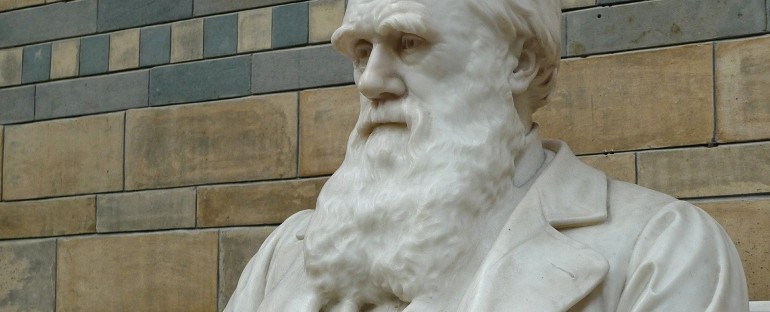I sometimes hear the question (always from Darwinists): “What is a Darwinist?” In a 2006 lecture given at the University of Michigan, Eugenie Scott, former head of the National Center for Science Education stated: “I am not a Darwinist. I don’t know what Darwinism is.” Well, if she does not know what a Darwinism is, how does she know that she is not a Darwinist? Then she rails against the terms “Darwinist” and “Darwinism,” saying that the term “Darwinism” is an “ism,” an “ideology;” and “ideologies should have no part of science.” Of course she repeatedly uses the terms “creationist” and “creationism.”1 And her book is titled Evolution vs. Creationism. I point out this hypocrisy in my YouTube video on this subject.2
But for all of you out there that are asking this question, I will answer it for you. A Darwinist is simply someone that believes that life started out as a “simple” single celled organism, and gained enough genetic information to become all of life on this planet, in all of its integrated complexity. Note that I have the term “simple” in quotes. We have never observed a simple single celled organism.3
A Darwinist could be an atheist or a theistic evolutionist. If you believe that God guided the process, then you are a theistic evolutionist. If you believe that this happened through natural processes – without anyone asking the question: “Where are we going with this?” – then you are an atheist.
The reason that I use the term “Darwinist,” as opposed to “evolutionist,” is clarification. Darwinists themselves love to equivocate on the term “evolution.” They will point to a bacteria becoming immune to antibiotics and say: “You can see evolution happening!” But what are they talking about, a bacteria becoming immune to antibiotics, or a “simple” single, celled organism gaining enough genetic information to become all of life on this planet? And then they will argue it is the same thing. They argue that with the magic wand of time, all of those little changes will add up to the big changes – extrapolation.
But now that we understand more about DNA and genetics, Darwinists have a problem – How was all of this genetic information created? The answer that Darwinists have come up with is random mutations and natural selection. Random mutations are nothing more than copying errors, like if you are copying some instructions to make something and just start making mistakes in the copying. Natural selection happens. But it has its limitations. It can only select what is already there. And it works very inefficiently; which is probably a good thing. If it worked more efficiently, none of us would be here, as we all are carrying genetic mutations that are not good and are building up – genetic load.4 And a lot of genetic mutations are quite harmful.5
So the theistic evolutionists are correct in that the only way that this could work would be if God guided this process. But then once you accept God, why bother with Darwinian evolution? Alfred Russell Wallace, was a contemporary of Darwin and co-founded this idea that higher forms of life evolved from lower forms of life. But Wallace understood that human beings have attributes that cannot be adequately explained by development through purely natural processes. Charles Darwin responded with: “I hope you have not murdered too completely your own & my child.”6 So as I have stated before, theistic evolutionists need to understand that is the whole point of Darwinian evolution – to attempt to explain things without God. “Don’t let anyone capture you with empty philosophies and high-sounding nonsense that come from human thinking and from the spiritual powers of this world, rather than from Christ.” – Colossians 2:8 NLT.
Terry Read
Footnotes:
- (48) Intelligent Design and Creationism/Evolution Controversy – YouTube
- (48) Eugenie C Scott – YouTube
- The-Complexity-of-the-Cell.pdf (usp.br)
- Dr. John Sanford Lectures on Inevitable Genomic Deterioration | Educate Truth
- Genetic Disorders (genome.gov)
- Wallace and Darwin – ScienceDirect
Recent Posts
Recent Comments
Archives
- February 2022
- December 2021
- October 2021
- August 2021
- July 2021
- March 2021
- February 2021
- December 2020
- October 2020
- September 2020
- August 2020
- May 2020
- April 2020
- March 2020
- February 2020
- November 2019
- October 2019
- September 2019
- August 2019
- July 2019
- June 2019
- May 2019
- April 2019
- March 2019
- February 2019
- January 2019
- November 2018
- September 2018
- August 2018
- July 2018
- June 2018
- May 2018
- April 2018
- February 2018
- January 2018
- December 2017
- November 2017
- October 2017
- August 2017
- July 2017
- June 2017
- May 2017
- March 2017
- February 2017
- January 2017
- December 2016
- November 2016
- October 2016
- August 2016
- July 2016
- June 2016
- May 2016
- April 2016
- March 2016
- February 2016
- January 2016
- December 2015
- November 2015
- October 2015
- September 2015
- August 2015
- July 2015
- June 2015
- May 2015
- April 2015
- March 2015
- February 2015
- January 2015
- November 2014



